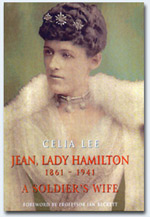
Finest Hour 189
That Other Hamilton Woman

October 4, 2020
Finest Hour 189, Third Quarter 2020
Page 45
Review by Andrew Roberts
Celia Lee, Jean, Lady Hamilton 1861–1942: Diaries of a Soldier’s Wife, Pen and Sword, 2020, £19.99. ISBN 978–1526786585
Andrew Roberts’ most recent book is Leadership in War (2019). ,
Readers of Finest Hour who are familiar with Winston Churchill’s role in initiating the Gallipoli campaign in 1915 will instantly recognise the name of Sir Ian Hamilton, the commander of that tragically doomed expedition. Churchill had recommended Hamilton, a distinguished Edwardian soldier and long acquaintance, to Lord Kitchener, the secretary for war, for that high command, which turned out to be an utterly poisoned chalice.
The young cavalry officer had been thrilled to come to the attention of the famous soldier, Ian Hamilton, who was twenty-one years his senior. Churchill’s sixth book, Ian Hamilton’s March, was written to honour his achievements in the South African war. They remained firm friends and shared many of the liberal, and indeed Liberal, beliefs of the day. Both were opposed to harsh peace settlements with the Boers in 1902 and the Germans in 1918.

2025 International Churchill Conference
Celia Lee has an unrivalled knowledge of the invaluable and detailed diaries kept by Jean, Ian Hamilton’s wife, and has written a remarkable biography based on those intimate daily records of the life of a member of the Edwardian power elite. Jean, the daughter of a millionaire Scottish entrepreneur, had a profound effect on Hamilton’s career at crucial moments. And through her deliciously gossip-ridden diaries we get many wonderful anecdotes about life in that gilded age.
It will be the many diary entries that concern Churchill and his wider family that will be of particular interest to fellow Churchillians. On their first acquaintance, Jean was not greatly taken with the “young man in a hurry,” and it did not help that she caught him out in a mild social fib in 1902. Churchill had sent a formal decline of a dinner invitation, signed by his secretary, pleading his busy political schedule. Yet Jean’s friend, Pamela Plowden, who Churchill was wooing, had already told her she could not attend because he was taking her out to dinner à deux that very evening. Jean mischievously had the letter framed and hung on a wall in her house for many years after.
She quickly warmed to Churchill, however, as he was a constant guest of her husband, and Jean and Winston shared a love of painting. In 1921 Jean paid £50 for a gorgeous picture of Ightam Moat, now a National Trust property in Kent. (Hamilton bequeathed the painting to Ightam Moat in his will.)
The many dinner table stories recounted by Jean in this volume include one from February 1910 that shows, in a way no official record could, the humanitarian in Churchill. As Home Secretary he said it weighed on his mind that he had just signed his first death sentence, on a man who had abducted a girl and brutally cut her throat in an alley. “I was relieved,” Jean wrote, “and said cheerfully: ‘That would not weigh on my mind.’ ‘Think,’ he said rather savagely, ‘of a society that forces a man to do that.’” The discussion continued about the criminal liability of lunatics; Jean found Winston “sensitive and excitable.”
During the First World War, Jean recorded her admiration for the war work conducted by Clementine Churchill, who organised canteens for women working in munitions factories. At a dinner towards the end of the conflict, the pregnant Clementine, worried about her family finances, even offered to give her unborn child to the childless Jean Hamilton. There could hardly be a more graphic example of the closeness of their families and friendship. That child was Marigold who, of course, was not given up but tragically died at the tail end of the Spanish Flu pandemic.
The friendship between the Churchills and the Hamiltons was sealed after the collapse of the Gallipoli catastrophe, when the two men worked hand-in-glove during the inevitable public Inquiry into all the things that had gone so badly wrong in that campaign. As the progenitor of the expedition and its commander, Churchill and Hamilton were in the forefront of the potential criticism, yet through their patient, factual and eloquent explanations of every stage of the operations, closely coordinated between them throughout the Inquiry, they encouraged the Dardanelles Report to place the blame where it deserved to fall, rather than primarily on them.
In 1919, the Hamiltons first rented and then purchased from the Churchills the beautiful country estate of Lullenden in East Grinstead in Sussex. These large-scale expenditures were, of course, entirely due to Jean’s inheritance. It is worth noting that Ian Hamilton owned the shooting rights on the Chartwell estate and almost certainly introduced Winston to the property that became the most important to him, and to Churchillians everywhere.
Subscribe
WANT MORE?
Get the Churchill Bulletin delivered to your inbox once a month.



